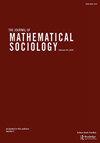利他主义能带来冒险的意愿吗?
IF 0.7
4区 社会学
Q3 MATHEMATICS, INTERDISCIPLINARY APPLICATIONS
引用次数: 0
摘要
摘要我研究了一个人在与他人积极交往的情况下对风险承担的态度,即利他主义。这项研究是必要的,因为目前还不清楚利他主义是如何影响利他主义者冒险的倾向的。如果另一个人的效用不进入他的效用函数,这个人的冒险行为会不同吗?利他主义是否会使一个人变得更不愿意冒险,因为一项有风险的事业失败了也会损害他进行利他主义转移的能力?还是利他主义会导致一个人采取冒险行为,因为成功结果的回报会被结果放大,从而促进利他行为的受益者获得更大的收益?具体来说,在保持其他变量不变的情况下,我问:一个利他主义的人比一个非利他主义的人更厌恶风险还是更不厌恶风险?为了回答这个问题,我使用了一个简单的模型,在这个模型中,偏好由对数效用函数表示,我展示了一个利他主义的人,他是一个积极的捐助者(捐助者),比一个不利他主义的人更少的风险厌恶:利他主义是一个更愿意承担风险的原因。利他主义特质会导致更大的冒险意愿,这一发现此前在现有文献中没有被注意到。关键词:利他主义利他主义转移相对风险厌恶利他主义强度感谢我感谢一位推荐人的启发性评论和善意的话语,感谢扎克·阿尔姆奎斯特的建议和指导。披露声明作者报告无任何类型的利益冲突。注1据我所知,从Phelps (Citation1975)的研究文集到bourl本文章由计算机程序翻译,如有差异,请以英文原文为准。
Can altruism lead to a willingness to take risks?
ABSTRACTI study attitudes towards risk taking in cases where a person relates to others positively, namely altruistically. This study is needed because it is unclear how altruism influences the inclination of an altruistic person to take risks. Will this person’s risk-taking behavior differ if the utility of another person does not enter his utility function? Does being altruistic cause a person to become more reluctant to take risks because a risky undertaking turning sour will also damage his ability to make altruistic transfers? Or does altruism induce a person to resort to risky behavior because the reward for a successful outcome is amplified by the outcome facilitating a bigger transfer to the beneficiary of the altruistic act? Specifically, holding constant other variables, I ask: is an altruistic person more risk averse or less risk averse than a comparable person who is not altruistic? In response to this question, using a simple model in which preferences are represented by a logarithmic utility function, I show that an altruistic person who is an active donor (benefactor) is less risk averse than a comparable person who is not altruistic: altruism is a cause of greater willingness to take risks. The finding that the altruism trait causes greater willingness to take risks has not previously been noted in the existing literature.KEYWORDS: AltruismAltruistic transfersRelative risk aversionIntensity of altruism AcknowledgmentsI am indebted to a referee for illuminating comments and kind words, and to Zack Almquist for advice and guidance.Disclosure statementThe author reports no conflict of interest of any type.Notes1 To the best of my knowledge, texts on altruism spanning from the collection of studies in Phelps (Citation1975) to Bourlès et al. (Citation2021) did not address this question. When altruism and risk-taking behavior were linked, the context was the perception of the recipients of the altruistic transfers that altruism provides them with a form of insurance.
求助全文
通过发布文献求助,成功后即可免费获取论文全文。
去求助
来源期刊

Journal of Mathematical Sociology
数学-数学跨学科应用
CiteScore
2.90
自引率
10.00%
发文量
5
审稿时长
>12 weeks
期刊介绍:
The goal of the Journal of Mathematical Sociology is to publish models and mathematical techniques that would likely be useful to professional sociologists. The Journal also welcomes papers of mutual interest to social scientists and other social and behavioral scientists, as well as papers by non-social scientists that may encourage fruitful connections between sociology and other disciplines. Reviews of new or developing areas of mathematics and mathematical modeling that may have significant applications in sociology will also be considered.
The Journal of Mathematical Sociology is published in association with the International Network for Social Network Analysis, the Japanese Association for Mathematical Sociology, the Mathematical Sociology Section of the American Sociological Association, and the Methodology Section of the American Sociological Association.
 求助内容:
求助内容: 应助结果提醒方式:
应助结果提醒方式:


